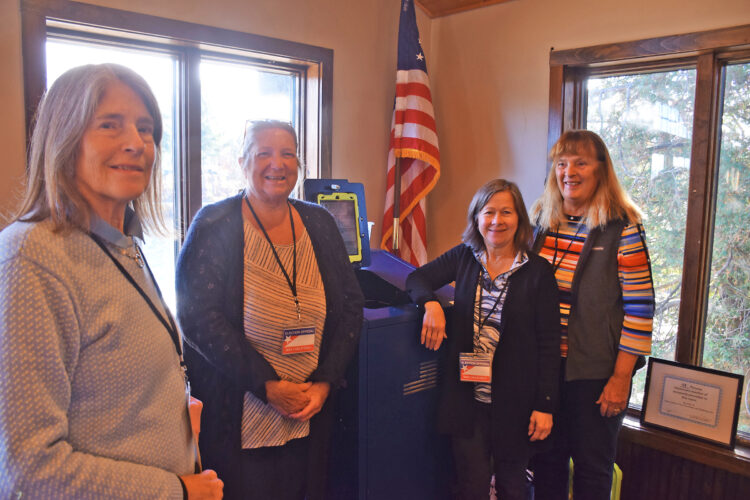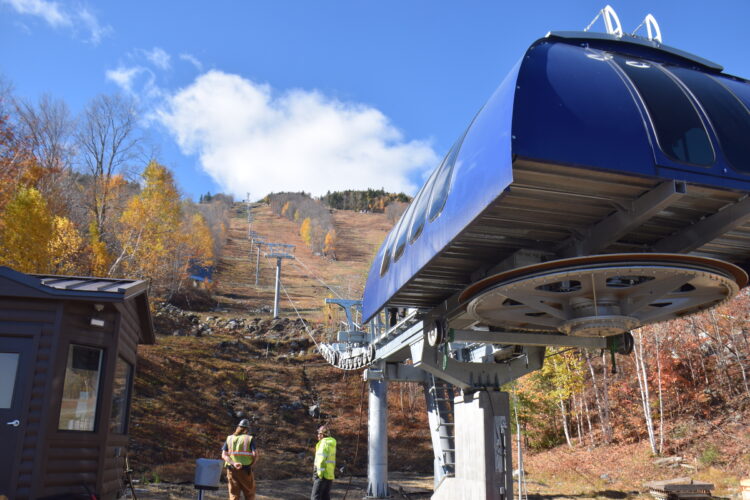Collecting American stories ‘present in the moment’
National oral history effort with Adirondack roots seeks perspectives on life in US right now
- Mitch Teich, left, conducts an interview for KNAU, a public radio station in Flagstaff, Arizona. (Provided photo — Mitch Teich)
- Mitch Teich, station manager at NCPR, pictured on the job. (Provided photo — Mitch Teich)
- Mitch Teich, station manager at NCPR, pictured at an event. (Provided photo — Mitch Teich)
- Cal Page-Bryant, a Wilmington native and current UVM student, at Clements Pond in Keene in 2024. (Provided photo — Cal Page-Bryant)
- Jim Gorman, a former New York Times science reporter, is pictured on an assignment in Alaska. (Provided photo — Jim Gorman)
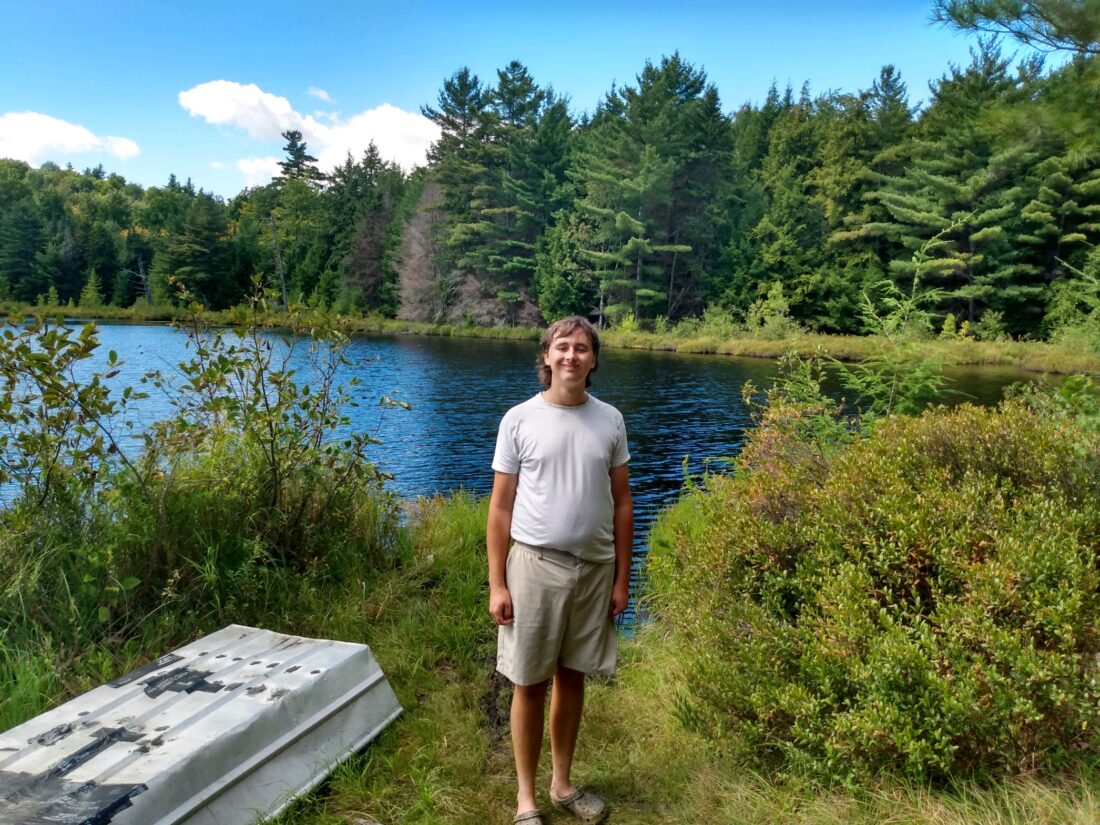
Cal Page-Bryant, a Wilmington native and current UVM student, at Clements Pond in Keene in 2024. (Provided photo — Cal Page-Bryant)
KEENE VALLEY — A new storytelling project launched in the Adirondacks aims to keep an oral record of what life is like in America right now. OurStoryBridge Listens, launched on Aug. 19, is the newest project that has branched off of OurStoryBridge, an oral history nonprofit launched by Keene Valley resident and volunteer Jery Huntley.
For Huntley, the goals are simple: “Listen to people when they need to be listened to.”
The stories fall into seven categories: the economy, freedom and justice, immigration, health care, humanities and education, the environment and community resilience. The narratives are recorded on the website, ourstorybridgelistens.org, along with slideshows of photos submitted by the storytellers.
The project is non-partisan, and Huntley said she invites — and expects — stories from a variety of viewpoints, even some that disagree with some of the perspectives that have already been shared. She said a common thread is that everyone has concerns about current events, but people are coming with differing perspectives.
“We’re happy to collect them, and I think that will make the collection richer,” she said. “It’s good to hear from all of them. And I have no doubt that we will hear from a variety of opinions.”
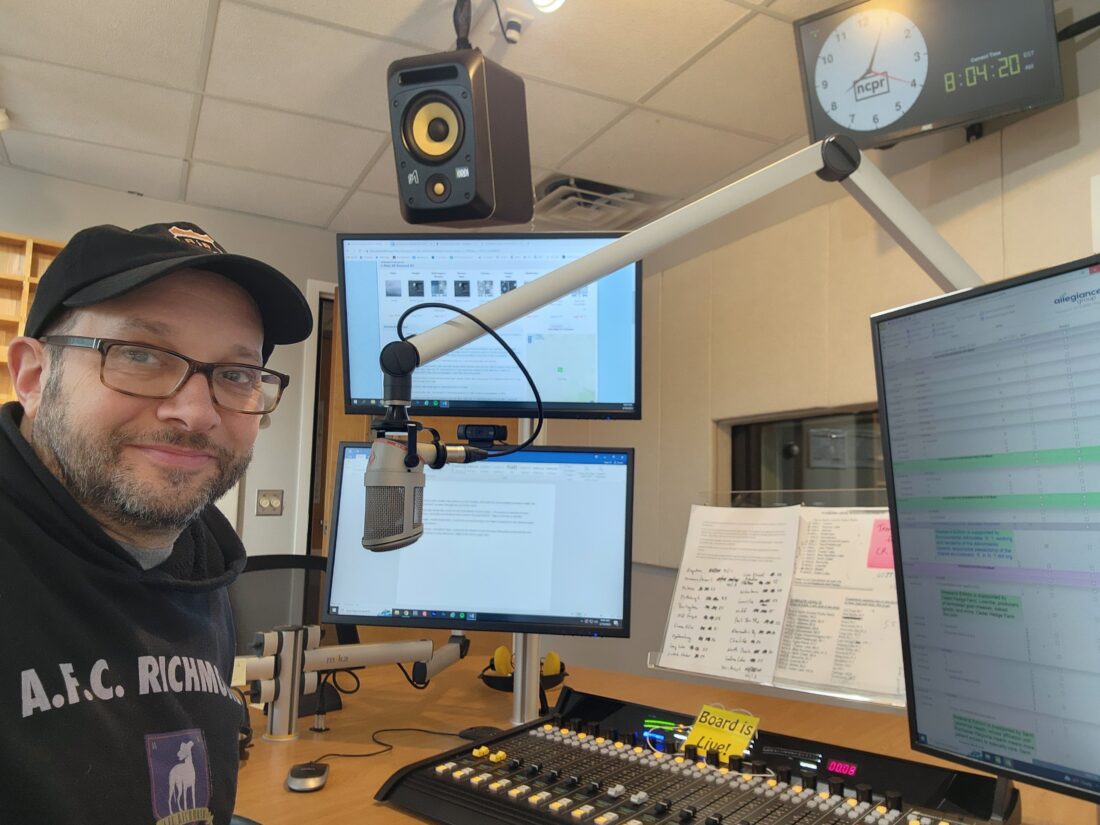
Mitch Teich, station manager at NCPR, pictured on the job. (Provided photo — Mitch Teich)
Anyone with a story to tell related to any of the seven categories is invited to fill out the form on the website or email listen@ourstorybridge.org. Stories can be up to five minutes long. Huntley said they aim to collect 100 stories by the end of the year.
In addition to providing a forum for a large number of diverse stories to be collected and shared, Huntley hopes the collection can be useful to organizations who need insight on how real people are affected by events and policies. OurStoryBridge is working on distributing the stories to nonprofits and associations around the country.
“It is anticipated that the stories will help both present-day researchers and future historians better understand this pivotal moment in American history,” Huntley wrote in a statement announcing the website’s launch.
To read more about OurStoryBridge and other oral history projects, visit tinyurl.com/5n6dbyaj.
–
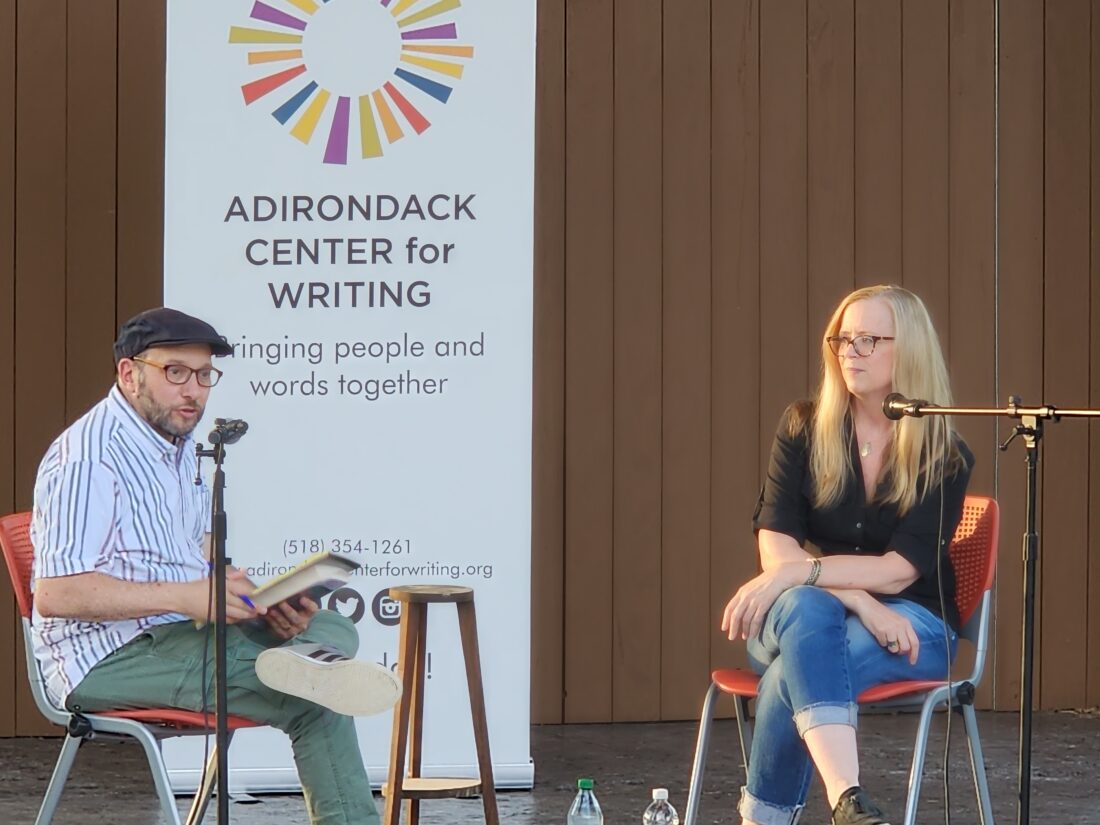
Mitch Teich, station manager at NCPR, pictured at an event. (Provided photo — Mitch Teich)
Jim Gorman, Keene
–
Jim Gorman worked for the New York Times as a science reporter for 28 years, and has spent his life working to explain science to the public. His books cover topics from penguins to dinosaurs.
“The thread through it all is a delight in science,” he said. “I have a strong conviction that that’s the best way to understand the way the world works. It’s not perfect, it has many flaws, but it at least tries to correct itself.
“It has some similarities to democracy itself, that in order for it to work, you have to have valid information. You have to have people constantly challenging the information.”
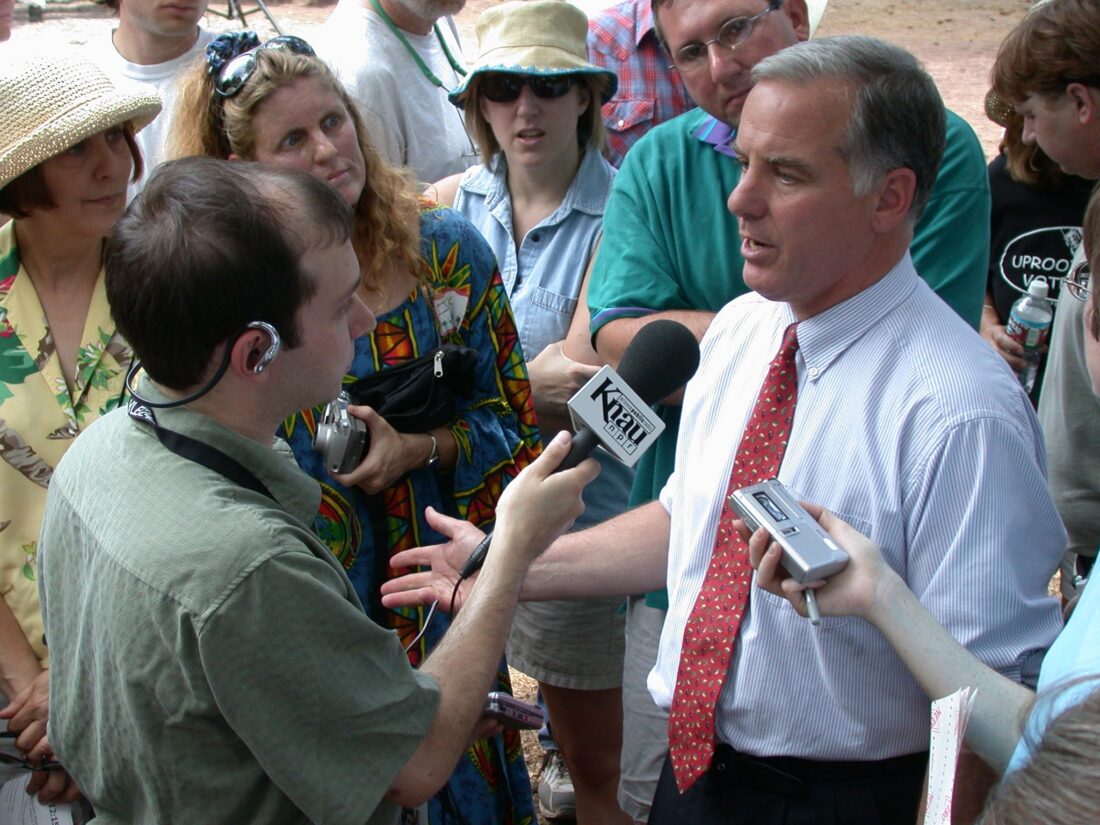
Mitch Teich, left, conducts an interview for KNAU, a public radio station in Flagstaff, Arizona. (Provided photo — Mitch Teich)
Gorman is alarmed by current events which he sees as an “attack on facts,” including the recent firing of the head of the Bureau of Labor Statistics. He said people are free to disagree about facts, but that basic, publicly available information needs to be trustworthy.
“(What) strikes through the heart of my whole career is the effort to deny the validity of scientific information, to stop scientific research, and to make it so that it’s not clear what information is valid,” he said. “If you don’t have valid information, there’s no way to know how to act and there’s no way to know how to have a conversation, because it becomes one side or the other, us versus them.”
Gorman has covered some controversial subjects in his time, such as the use of chimpanzees for experimentation. The basic tool for communicating to the public about these topics was simply to interview people on both sides and present valid information for both.
At the end of his tenure at the Times, he helped cover the coronavirus pandemic, and this simple approach didn’t work as well. He had to deal a lot more with politicians, in addition to scientists, and outside agendas made those topics more adversarial.
Gorman feels relatively lucky right now — he’s not an immigrant at risk of deportation and since he’s retired, his job isn’t at risk, he said. However, he decided it would still be valuable to add his experience to this oral history project that documents people’s experience right now.
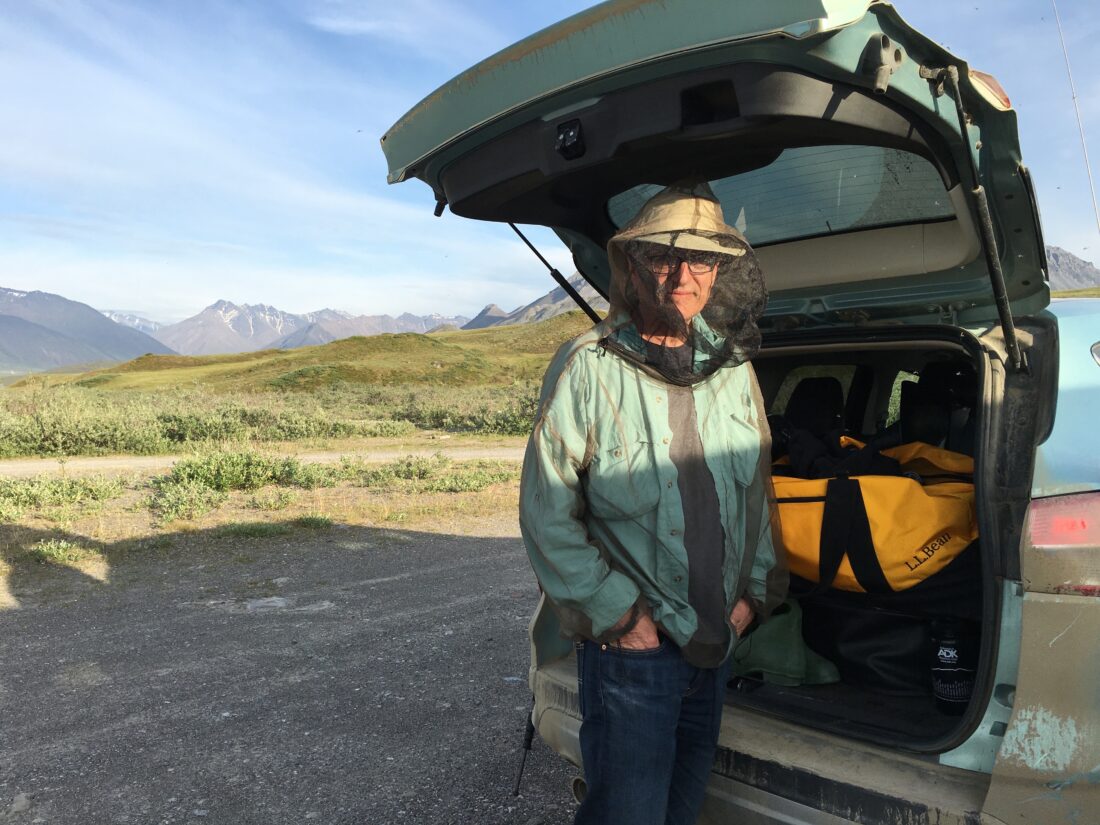
Jim Gorman, a former New York Times science reporter, is pictured on an assignment in Alaska. (Provided photo — Jim Gorman)
“It’s worth it that people say ‘There are facts out there. Science isn’t perfect, but it’s one way of figuring out what’s going on in the world,'” he said.
–
Cal Page-Bryant, Wilmington
–
Cal Page-Bryant is a Wilmington native starting his sophomore year at the University of Vermont. He’s studying biological science and anthropology — and dreaming of becoming a primatologist. He said a lot of students from the Adirondack Park get drawn toward environmental studies.
“It’s what they grow up with, so its gotta be part of it … learning how it all fits together,” he said.
Page-Bryant grew up taking for granted the environmental protections that were enshrined in the state constitution. Now, even those basic assumptions feel shaky to him.
“The word ‘constitutional’ doesn’t seem to have any meaning,” he said. “Seeing things happening on the federal level to national parks and lands … growing up believing that it’s never going to be taken away from you and at this level of chaos, not knowing what’s going to happen it feels like the rug is sort of ripped out from under us and I figured a lot of people in the park would feel the same way.”
As a young person, he said it feels disorienting to be spending time studying things that are “theoretically important” but feel disconnected from the climate crisis he sees. He’s also disturbed by other things that are happening in the country, like ICE raids and the cutting of USAID.
He said it has been a “wonderful privilege” to contribute to the oral history project.
“It seems especially important and relevant and a local, in-progress detailing of real human experiences and the real consequences of broad, sweeping national actions,” he said.
–
Mitch Teich, Canton
–
Mitch Teich, currently the station manager of North Country Public Radio, has worked in radio broadcasting for more than 30 years. The seed for this interest was planted when he visited a radio station during first grade. He got to see the studio, talk into a microphone and record a commercial.
“Frankly, I thought it was so cool that it stayed on my radar for pretty much my entire life,” he said.
He has worked at radio stations in multiple states, in addition to NCPR. One experience that really taught him the value of public radio was in the Adirondacks during the January 1998 ice storm. Other news outlets had lost power, but they managed to keep the radio on the air as the sole source of information.
“We figured out that local news wasn’t just what politicians were saying. Local news became where could you get propane, or a hot meal, or what gas stations were open,” he said. “But it was also about keeping people company.”
Teich said he has thought a lot about how his work has been politicized. Despite that, he said that during the last 30 years, he and his colleagues haven’t really changed how they do their work. They still think of themselves as a community service. In many ways, he said, it feels like it’s the world that’s changed around them.
“(We) go out and treat our interview sources with respect and honesty and try to tell the best stories that we can,” he said.
The station is currently in the process of fundraising to make up for the $670,000 that the station lost when Congress passed a recissions package clawing back more than $1 billion in previously approved funding for the Corporation for Public Broadcasting last month.
Teich said the station is faring pretty well — as of Tuesday, Aug. 26 they had raised about $476,000.
“It has been really gratifying to see just how much the community has risen up to have our backs,” he said. “We’ve always said the strength of NCPR has been in how strongly we connect with our audience and with the community at large. This has been a good reminder that it’s really true.”
However, the bigger question is whether this level of fundraising can be sustained. Teich said it’s hard to tell how much of the fundraising might just be normal donors giving their normal donations a bit earlier than usual. The challenge for them will be to communicate with listeners that this is a recurring need, and to brainstorm other ways, such as a capital campaign, that the station might be able to become self-sufficient.


